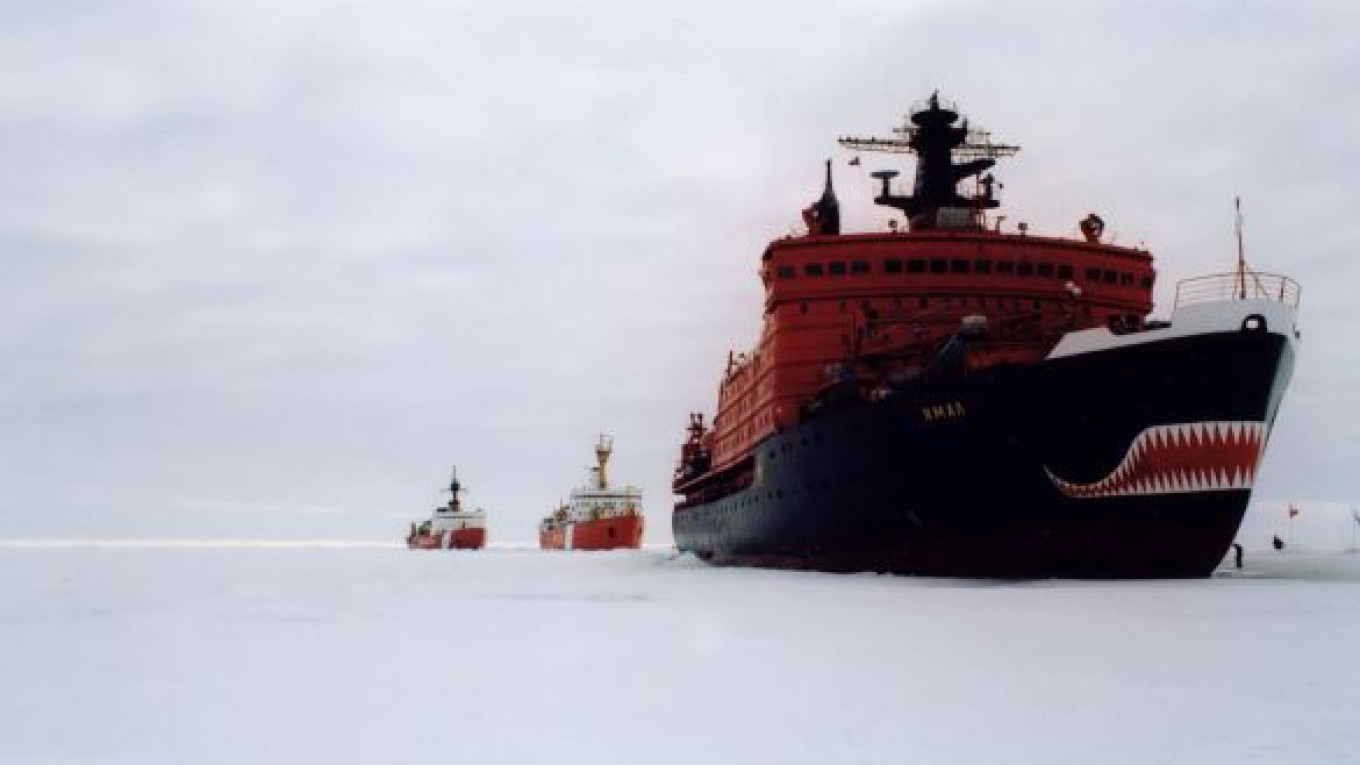TROMSO, Norway — A Rosatomflot executive predicted on Tuesday a surge in voyages on an Arctic shortcut sea route in 2011 as a thaw linked to climate change opens the region even more to shipping and oil and mining companies.
High metals and oil prices, linked to rising demand from China and other emerging economies, is helping spur interest in the Arctic and the route between the Atlantic and Pacific Oceans as an alternative to traveling via the Suez Canal.
"In 2011 the shipping on the Northern Sea Route is going to increase significantly," Mikhail Belkin, Rosatomflot assistant director, said at the Arctic Frontiers conference in Tromso, northern Norway.
He said state-owned Rosatomflot, which sends one of its nine atomic-powered icebreakers to accompany each trip in case of ice, has received 15 applications to accompany voyages across the Arctic in 2011, against four trips in 2010.
"The potential savings are too large to be ignored," said Felix Tschudi, whose shipping group chartered the MV Nordic Barents in 2010 to carry 40,000 tons of iron ore for Northern Iron from Norway to China.
Tschudi said the voyage was about 12,040 kilometers, about half the distance of the journey via the Suez Canal and it saved 17 1/2 days as well as fuel. Icebergs meant high insurance costs but there are no pirates, unlike off Somalia.
He said Rosatomflot charged about $200,000 to accompany the ship, more than fees on the Suez Canal. It was the first commercial vessel on the route that was not owned by Russia and traveled to and from non-Russian ports.
Arctic Sea ice shrank in summer 2010 to the third smallest since satellite records began, after lows in 2007 and 2008. The U.N. panel of climate scientists says greenhouse gas emissions are very likely the main cause.
Belkin said other voyages in 2010 were to accompany an out-of-service passenger ferry, a tanker and a Swedish icebreaker. In 2011, several oil or gas tankers were applying for the route.
Indigenous peoples expressed worries about oil exploration and mining in the remote region, where it could be far harder to stem oil leaks than, for instance, in the Gulf of Mexico after BP's catastrophic spill in 2010.
"The pace of development must meet our needs and not the needs of those who come to invest and those who come to take," said Aqqaluk Lynge of Greenland, head of the Inuit Circumpolar Conference, which says it represents 150,000 Inuit.
Lynge said investments such as oil and gas or aluminum could threaten hunting and fishing livelihoods and leave no lasting benefits for indigenous peoples.
But oil firms say they will take care of the environment.
"The world needs energy. We think that to supply that demand we have to go into the Arctic regions," said Steiner Vaage, head of ConocoPhillips Norway.
Norway, Finland, Russia and Sweden have all stepped up iron ore mining around the Barents Sea, said Morten Smelror, head of the Geological Survey of Norway.
"The main driving forces of these new investments are high prices of materials," he said, projecting that strong growth in emerging economies would keep up demand in coming years.
He said promising, unexploited deposits around the Arctic included diamonds in Canada and rare earths in Greenland.
A Message from The Moscow Times:
Dear readers,
We are facing unprecedented challenges. Russia's Prosecutor General's Office has designated The Moscow Times as an "undesirable" organization, criminalizing our work and putting our staff at risk of prosecution. This follows our earlier unjust labeling as a "foreign agent."
These actions are direct attempts to silence independent journalism in Russia. The authorities claim our work "discredits the decisions of the Russian leadership." We see things differently: we strive to provide accurate, unbiased reporting on Russia.
We, the journalists of The Moscow Times, refuse to be silenced. But to continue our work, we need your help.
Your support, no matter how small, makes a world of difference. If you can, please support us monthly starting from just $2. It's quick to set up, and every contribution makes a significant impact.
By supporting The Moscow Times, you're defending open, independent journalism in the face of repression. Thank you for standing with us.
Remind me later.






